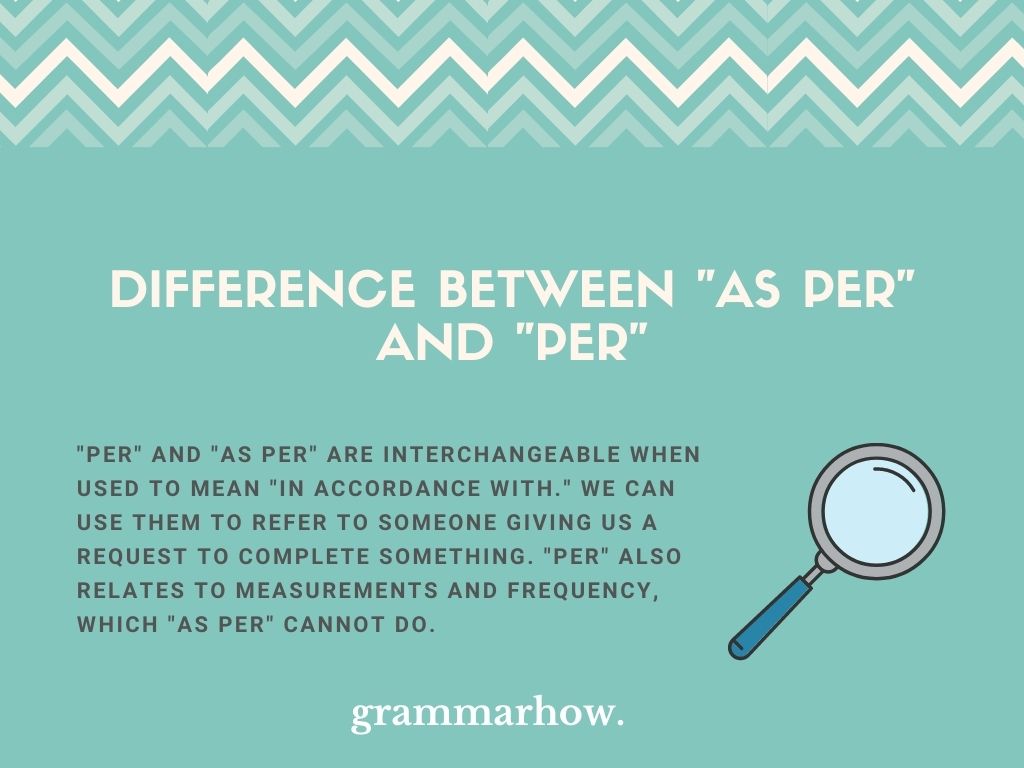“As per” and “per” function in very similar ways. It’s wise to learn how the two phrases work (and where their differences lie). This article will explain all you need to know about them to make sure you’re using them correctly.
What Is The Difference Between “As Per” And “Per”?
“Per” and “as per” are interchangeable when used to mean “in accordance with.” We can use them to refer to someone giving us a request to complete something. “Per” also relates to measurements and frequency, which “as per” cannot do.

When interchangeable, you can see the two phrases in the following situations:
- Per John’s request, I’ve made a list of the things to do here.
- As per Joanna’s request, I’ve made sure to get this completed.
As you can see, there is no difference between the two phrases. Some people think “as per” is redundant, though. “As” and “per” both work in place of it, so combining the two words together makes little sense to most writers.
“Per” can also be used when referring to frequencies, but “as per” cannot. Here’s how that works:
- Correct: There will need to be three people per table.
- Incorrect: I want at least five dollars as per person.
What Does “As Per” Mean?
“As per” is a good choice when you want to show that you are following certain rules or requests. It means “in accordance with,” which works when someone has asked us to do something, and we are choosing to act on it.
- As per the request I made earlier, I’ve put forward some ideas that should make this easier for everyone to agree with.
- I have completed all that you wanted me to do as per the email you sent to us.
- As per John’s statement, we have made all the relevant changes to these regulations. Hopefully, we won’t have a repeat incident.
- As per my email, I believe we will be meeting to discuss this further in the next few hours. Please be on alert.
- I think he let it happen as per the message they sent him. It seems like they’re in cahoots about all of this.
What Does “Per” Mean?
“Per” can mean the same as “as per.” It’s more formal in many cases because it does not include the redundant “as” in the phrase. It also works to refer to frequencies or the amounts of things you’ll need for every item or person in a group.
When used to mean “in accordance with,” it works like this:
- Per my previous communication with you, I’d like to be trialed for the promotion. I think I can offer a lot.
- I want to get this sorted per my request. I think it’s only fair that you consider me for such an option.
- Per Terry’s findings, I think we need to do something to stop everyone from catching on. It’s going to be difficult.
We can also use it in the following situations to refer to frequencies:
- I will need to find at least one adult per six children if I want this trip to be a success.
- You will find it better to spend twenty dollars per person. You’ll get much better service if you do that.
- Six hours per client seems a bit much. I don’t think I have enough time in the month to get them all sorted!
Are “As Per” And “Per” Interchangeable?
When using the two phrases to mean “In accordance with,” they are both interchangeable. Both phrases are correct, and it’s always acceptable to remove “as” from “as per” and still have the meaning be clear.
However, “as per” does not work when referring to frequencies. It’s best if you avoid using it in cases like this because it simply does not get the correct point across.
Is “As Per” Or “Per” Most Formal?
“Per” is the most formal choice of the two. It removes the redundant “as” from the phrase, which is the best way to show that you’re following formal rules.
Also, many people think “as per” sounds pretentious. They don’t like reading it because it makes it seem like someone is better than you.
- Per your request
- As your request
These two phrases work well, showing that “per” and “as” are correct in many cases.
Combining the two is a bit more pompous, so it’s best to avoid it formally.
You may also like:
“Per [person’s name]” – Meaning Explained (Helpful Examples)
“Per” vs. “According To” – Difference Explained (Helpful Examples)
“As per your request” meaning: 4 examples of how to use it in a sentence
Per Usual – Meaning & Usage (10+ EXAMPLES)
10 Better Ways To Say “As Per Our Conversation”

Martin holds a Master’s degree in Finance and International Business. He has six years of experience in professional communication with clients, executives, and colleagues. Furthermore, he has teaching experience from Aarhus University. Martin has been featured as an expert in communication and teaching on Forbes and Shopify. Read more about Martin here.
